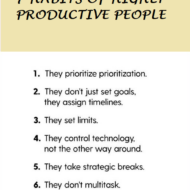Posted by Managementguru in Artificial Intelligence, Business Management, Change management, Human Resource, Productivity, Training & Development
on Feb 15th, 2020 | 0 comments

How Artificial Intelligence Can Help Increase Employee Engagement Employee engagement is crucial to the success of your business; without engaged employees, your business will have a tough time expanding. According to Gallup’s State of the Global Workplace report, 85% of employees are actively disengaged in their workplaces. Disengaged employees are less effective at their work, and can contribute to a drop in company revenue over time. Here are some ways that Artificial Intelligence (AI) can help keep your workforce engaged and working at their full potential. Robotic Process Automation Robotic Process Automation, or RPA, is a great tool to remove repetitive tasks from your employees every-day routine. RPA harnesses the power of Artificial Intelligence by using digital software robots, or “bots”, to automate existing business processes. The Artificial Intelligence aspect of the bots enables them to work with “unstructured data” without hitting snags or complications. RPA can be applied to almost every industry and can help you become more efficient and save money in the long run. RPA has the power to increase employee engagement in a number of ways, the first being an increase in their mood. An IBM study on “The Financial Impact of a Positive Employee Experience” shows that “organizations that score in the top 25 percent on employee experience report nearly three times the return on assets compared to organization in the bottom quartile.” Making sure that your employees are happy and engaged can prove helpful for your bottom line. Removing repetitive tasks can also lead to an increase in creativity for your employees as they are being tasked with more challenging and thought-provoking work. Additionally, removing the monotonous work with RPA can provide more opportunities for upward mobility for workers, as more jobs now requiring a higher level of skill and insight. Picture Courtesy: Zibtek While a business is more than the sum of its parts, the truth is that workflows can either give a business the edge or keep it from growing. Here is a resourceful guide from Quandary Consulting Group to process improvement that covers the subject in full. Read on: Process Improvement: Cut Waste and Improve Business Efficiency Professional Development & Predictive Behavior Artificial Intelligence shows great promise for being able to help in the personal development of current employees. Using AI, companies are able to create personalized training programs for employees, which can align the material with different employees’ learning patterns and behaviors. Using this, employers can then target the specific needs of employees, instead of having to create blanket training that can often be repetitive to many. If a training program is largely computer-based, then AI can actually serve as the instructor for the course, creating more time for other training. AI technology has proven useful in its predictive behavior aspect and can be used in businesses to gain detailed information on why employees leave the company, enabling them to take preventive measures in the future. Picture Courtesy: Docebo Artificial Intelligence helps human resources develop more personalized feedback on an employee’s work, and more personal responses to any issues they might be having. This helps employees feel more valued at a company and can increase their engagement. Employee training programs are crucial for keeping an employee engaged in their work. If an employee is confused about any part of their task, and feels unable to ask for assistance, they will be less engaged in their job. In addition, you can use AI to help train employees on newer aspects of the company to keep furthering their development and open up new opportunities for them. AI can help identify factors that push employees to leave a company, allowing employers to...

Posted by Managementguru in Business Management, Change management, Entrepreneurship, How To, Productivity
on Feb 10th, 2020 | 0 comments

5 Productivity Tips for Savvy Small Business Owners Starting your own business is an exciting journey. You’re the boss! You make the rules…and you are largely responsible for setting your own hours, keeping your own workspace organized, and making sure your company reaches scheduled goals. Keeping your employees on track – not to mention staying productive yourself – can be a difficult task. These helpful tips show you how to make a few small changes which will dramatically increase your business’s overall productivity. Set Work Hours – And Stick to Them! Once you step away from the “normal” 9-to-5 workday, you run into a problem: deciding when to work. With the entire day available to you, it’s surprisingly easy to fall into the trap of “I’ll do it later”. Many small business owners find themselves struggling through the difficult early days of company growth working late into the night, battling endless distractions and adopting unsustainable sleep schedules. Avoid this by setting a schedule and stick to it. Work in 3 to 5-hour chunks with time blocked off for breaks in between. Once the workday is over, log out of your business accounts to avoid the temptation to keep working ‘round the clock. Office administrators often do all the behind the scenes work to help your office run smoothly, even in times like these where everyone is fully remote. To show your appreciation for all the work they do to keep things running smoothly and everyone in good spirits, consider getting them a gift for Administrative Professionals Day on April 22nd. There are plenty of remote gift ideas like sending them new home office tools or signing them up for an online meditation class to help them destress. For more inspiration on how to celebrate your office admin remotely, head over to Wikibuy’s blog post. Learn to Love Mornings You may be surprised to find that the average human is much more productive in the mornings. Our brains are awake, we’ve just gotten plenty of sleep, and distractions are less frequent as our friends and family are generally also working. Even if you’ve never been a “morning person,” you should give it a try! Wake up an hour – or even just a half hour – earlier than usual and spend that time working. You might be surprised to find out just how much you get done before lunchtime. Those formerly miserable morning hours can turn into prime productive, business-growing time! Don’t Be Afraid to Delegate Another productivity-destroying trap many small business owners get caught in is the desire to “do it all”. Wanting to be aware of everything that goes on, they waste time struggling through small, tedious tasks such as entering data, fussing with payroll details, and even keeping track of every employee’s schedules. Delegate some of these tasks to partners and employees within your business. This will give you, as the owner, more time to focus on the big picture: setting goals, securing funding and building relationships with clients and customers. This will benefit the entire business – workers will have clearly defined tasks and goals as well as be given chances to develop their own initiative, leadership and organizational skills. Introduce Productivity Tools Today, a wide variety of productivity tools are available, ranging from websites to smartphone apps to good old-fashioned journals and calendars. Take advantage of these tools to keep yourself and your employees organized and on track at all times! Set up a chat client so you can stay in touch with your team without needing to exchange endless emails. Have employees set up to-do lists on a shared web site or app so that you can...

Posted by Managementguru in Change management, Decision Making, How To, Human Resource, Learning, Productivity, Time Management
on Jan 14th, 2020 | 0 comments

Working in business is a promising career path because there are a lot of different directions you can go. The opportunities are endless if you continue to work hard and are dedicated to improving your skills over time. Be glad to know there are a few actions in particular that you can take if you want to quickly advance your business career. This way you can get on the right path to becoming a successful and productive employee with the potential to grow and learn over the years. It’s going to take time to get ahead because of all the competition, so be patient with yourself as you develop into the leader you know you can be. Further Your Education A good first step in the process of advancing your business career is to focus on furthering your education. For example, take advantage of your down time by studying for a Suffolk University Online MBA and earning your advanced degree. In this program, you’ll learn the skills and abilities you’ll need to solve complex problems at a global level and how to better analyze data. It’s a great way to polish up your resume and make sure you’re keeping up to speed with the ever changing landscape of the business world. Find A Mentor You may also find it useful to secure a mentor to help you advance your business career. You can bounce ideas off of this person about your performance and ask questions that will help you become a more desirable employee. Pinpoint someone who’s been in your shoes before and has been able to work their way up the corporate ladder. This way you can follow in their footsteps and also hopefully avoid any same mishaps or mistakes they made along the way. Set Goals & Track Your Progress You’ll get a lot further in your business career when you set goals for yourself and what it is you want to achieve in your profession. Not only write down your objectives, but then construct a timeline for how quickly you want to meet each goal. Monitor your progress as you go and don’t be afraid to make adjustments based on your results. For example, aim to go after a promotion at work or complete an online class in an area where you find you struggle the most. Having goals in place will help you to move forward in a promising direction instead of getting stuck in one place and lacking the motivation to advance in your career. Speak to Your Boss In addition, be open and honest with your boss about how you feel about your job and career. Let them know if you’re bored and how you feel they can help better support you and succeed. Discuss chances for you to showcase your skills and abilities in your performance reviews by setting goals together that you want to meet in the upcoming year. Talk about what they feel your strengths and weaknesses are so that you can apply this information while going after the next big promotion opportunity. Always be Networking It’s also in your best interests to always be networking and meeting new people inside and outside of work. Be proactive and use your network for support whenever you’re feeling lost or confused about how you should proceed. It’s possible someone you meet will have good career advice for you or know of a job opening that will be a better fit. Advance your business’ career by staying in touch with those you meet and helping each other out as you each work on getting ahead professionally. Take on More Responsibility at Work...

Posted by Managementguru in Change management, How To, Human Resource, Motivation, Training & Development
on Nov 25th, 2016 | 0 comments

“A goal should scare you a little and excite you a lot.” “A dream written down with a date becomes a goal. A goal broken down into steps becomes a plan. A plan backed by action makes your dreams come true.” “If a goal is worth having, it’s worth blocking out the time in your day-to-day life necessary to achieve it.” “Set a goal that makes you want to jump out of bed every morning.” “A goal without a plan is just a wish.” “Goals are like an address we punch into our navigation system that tells us which direction to go.” “Seeing your goal written in ink, on paper will have a powerful effect on your mind.” “Decide what you want. Decide what you are willing to exchange for it. Establish your goals and go to work.” Share one GREAT goal you’re looking to achieve this year with the rest of the community in the comment section below! Take print-outs using the print friendly icon in the share buttons. The Five Golden Rules Set Goals that Motivate You Set SMART Goals Set Goals in Writing Make an Action Plan Stick With...

Posted by Managementguru in Change management, How To, Organisational behaviour
on Oct 20th, 2015 | 0 comments

How to Overcome the Challenge of Resistance to Change? I’ve tried to supplement solutions to overcome the challenge of resistance to change in the form of quotes by lot of industry stalwarts and management scholars. It is true that change is the only entity that never changes. “Any change, even a change for the better, is always accompanied by drawbacks and discomforts.” ~Arnold Bennett Change is resisted because it can hurt. When new technologies displace old ones, jobs can be lost; prices can be cut; investments can be wiped out. The best thing leaders can do when the changes they seek pose significant threat is to be honest, transparent, fast, and fair. “He who rejects change is the architect of decay.” ~Harold Wilson Although leaders can’t always make people feel comfortable with change, they can minimize discomfort. Identifying the sources of resistance is the first step toward good solutions. And feedback from resistors can even be helpful in improving the process of gaining acceptance for change. The natural and normal reaction to change is resistance. Top Reasons “Why Employees Resist Change?” 1. Misunderstanding about the need for change/when the reason for the change is unclear — If staff do not understand the need for change you can expect resistance. Especially from those who strongly believe the current way of doing things works well…and has done for twenty years! In times of rapid change, experience could be your worst enemy. ~J. Paul Getty 2. Fear of the unknown — One of the most common reasons for resistance is fear of the unknown. People will only take active steps toward the unknown if they genuinely believe – and perhaps more importantly, feel – that the risks of standing still are greater than those of moving forward in a new direction “Future shock is the shattering stress and disorientation that we induce in individuals by subjecting them to too much change in too short a time.” ~Alvin Toffler 3. Lack of competence — This is a fear people will seldom admit. But sometimes, change in organizations necessitates changes in skills, and some people will feel that they won’t be able to make the transition very well. “Our dilemma is that we hate change and love it at the same time; what we really want is for things to remain the same but get better.” ~Sydney J. Harris 4. Connected to the old way — If you ask people in an organization to do things in a new way, as rational as that new way may seem to you, you will be setting yourself up against all that hard wiring, all those emotional connections to those who taught your audience the old way – and that’s not trivial. “When it becomes more difficult to suffer than to change… you will change.” ~Robert Anthony 5. Low trust — When people don’t believe that they, or the company, can competently manage the change there is likely to be resistance 6. Temporary fad — When people belief that the change initiative is a temporary fad 7. Not being consulted — If people are allowed to be part of the change there is less resistance. People like to know what’s going on, especially if their jobs may be affected. Informed employees tend to have higher levels of job satisfaction than uninformed employees. “The world hates change, yet it is the only thing that has brought progress.”~Charles Kettering 8. Poor communication — It’s self evident isn’t it? When it comes to change management there’s no such thing as too much communication. “If you feel like it’s difficult to change, you will probably have a harder time succeeding.” ~Andrea Jung 9. Changes...










